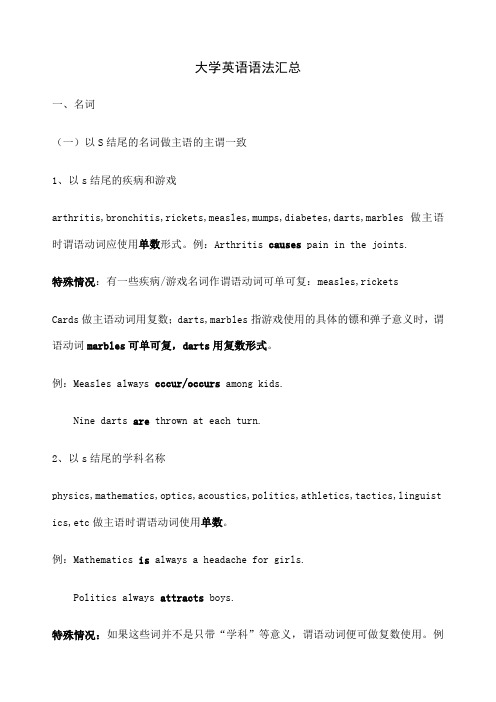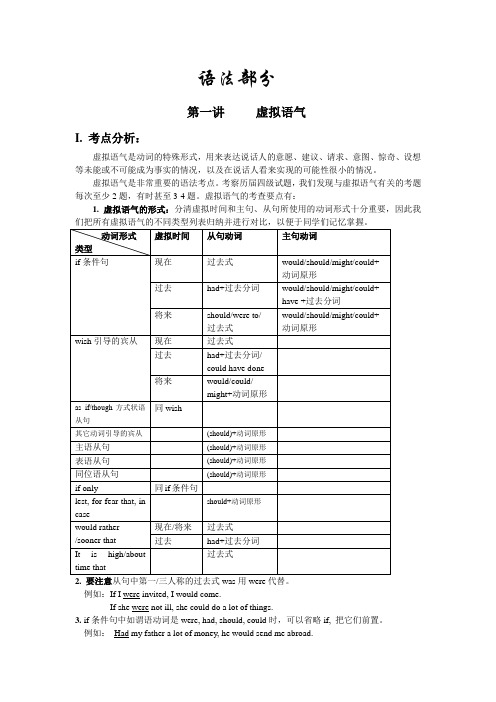大学英语语法讲解
大学英语基础知识点大一

大学英语基础知识点大一大学英语对于大一新生来说是一个重要的学科,它涵盖了基本的英语语法、词汇、阅读、听力和写作技巧。
本文将介绍一些大学英语基础知识点,帮助大一新生更好地应对这门学科。
一、英语语法英语语法是英语学习的基础,以下是一些重要的语法知识点:1. 时态:英语有多种时态,如一般现在时、过去时、将来时等。
掌握各种时态的用法和构成对于正确运用英语至关重要。
2. 语态:英语有主动语态和被动语态两种形式。
学生需了解被动语态的构成和使用场景。
3. 从句:学习掌握名词性从句、定语从句和状语从句等不同类型的从句,并能正确使用它们。
二、英语词汇扩大词汇量是提高英语水平的关键。
以下是一些建议:1. 单词记忆:利用词卡、手机应用等工具,记忆常用单词的拼写、发音和意义。
2. 词根词缀:学习一些常用的词根和词缀,可以帮助理解和记忆更多的单词。
3. 同义词和反义词:了解词汇的近义词和反义词,可以帮助丰富表达方式。
三、英语阅读阅读是提高英语综合能力的重要途径。
以下是一些提高英语阅读能力的方法:1. 阅读量:多读英语文章,包括新闻、故事、杂志等。
逐渐提高阅读难度,培养阅读理解能力。
2. 阅读技巧:学习使用略读、扫读、精读等不同的阅读技巧,提高阅读速度和理解力。
3. 生词学习:遇到不认识的生词时,学会通过上下文猜测词义,不必查字典。
四、英语听力听力是英语学习中的一项重要技能,以下是一些建议:1. 多听英语材料:如英语音乐、电影、电视剧和英语教材中的录音等。
通过多听,提高对英语语音、语调和表达方式的理解。
2. 留意听力材料的难度:初学阶段,选择适合自己的听力材料,逐渐增加难度。
3. 笔记记录:听英语材料时,可以同时记录重要的信息,以便后续复习和理解。
五、英语写作写作是对英语学习成果的输出,以下是一些写作技巧:1. 句型和连词的使用:学习一些常用的句型和连接词,使文章结构更加清晰和紧凑。
2. 逻辑思维:构思文章时,要注意逻辑关系和段落间的过渡,使文章条理清晰。
大学英语语法汇总

大学英语语法汇总一、名词(一)以S结尾的名词做主语的主谓一致1、以s结尾的疾病和游戏arthritis,bronchitis,rickets,measles,mumps,diabetes,darts,marbles做主语时谓语动词应使用单数形式。
例:Arthritis causes pain in the joints.特殊情况:有一些疾病/游戏名词作谓语动词可单可复:measles,ricketsCards做主语动词用复数;darts,marbles指游戏使用的具体的镖和弹子意义时,谓语动词marbles可单可复,darts用复数形式。
例:Measles always cccur/occurs among kids.Nine darts are thrown at each turn.2、以s结尾的学科名称physics,mathematics,optics,acoustics,politics,athletics,tactics,linguist ics,etc做主语时谓语动词使用单数。
例:Mathematics is always a headache for girls.Politics always attracts boys.特殊情况:如果这些词并不是只带“学科”等意义,谓语动词便可做复数使用。
例如,mathematics运算能力,athletic体育运动,acoustics音响效果,tactics策略,economics经济学意义。
例:The acoustics in Bon Jovi’s Tulsa concert were beyond criticism last spring.3、以s结尾的地理名称The States,the united states,the Netherlands,the Philippines,the United Arab Emirates,the United Nation做主语时,谓语动词使用单数。
大学英语语法总结(全面)

大学英语语法总结(全面)大学英语语法总结(全面完整版)1. 介词(Prepositions)- 表示地点:at, in, on- 表示时间:at, in, on- 表示方式:by, with- 表示原因:because of, due to- 表示目的:for, to2. 冠词(Articles)- 定冠词:the- 不定冠词:a, an3. 代词(Pronouns)- 主格代词:I, you, he, she, it, we, they- 宾格代词:me, you, him, her, it, us, them- 所有格代词:my, your, his, her, its, our, their- 反身代词:myself, yourself, himself, herself, itself, ourselves, themselves4. 名词(Nouns)- 单数名词:book, chair, dog- 复数名词:books, chairs, dogs- 不可数名词:water, money, information5. 动词(Verbs)- 一般现在时:I walk, you walk, he/she/it walks, we walk, they walk- 一般过去时:I walked, you walked, he/she/it walked, we walked, they walked- 现在进行时:I am walking, you are walking, he/she/it is walking, we are walking, they are walking- 过去进行时:I was walking, you were walking, he/she/it was walking, we were walking, they were walking- 一般将来时:I will walk, you will walk, he/she/it will walk, we will walk, they will walk6. 形容词(Adjectives)- 描述名词特征:big, small, tall- 比较级:bigger, smaller, taller- 最高级:biggest, smallest, tallest7. 副词(Adverbs)- 表示方式:quickly, slowly- 表示程度:very, extremely- 表示时间:now, yesterday8. 连词(Conjunctions)- 表并列:and, or- 表递进:furthermore, moreover- 表转折:however, but- 表原因:because, since以上是大学英语语法的简要总结,希望对你有帮助。
大学英语语法PPT(全)

3/4/2023
1、名词(n.): 表示人、事物、地点或抽象概念的名称。如:boy, morning, bag, ball, class, orange.
----《不列颠英语用法大全》
3/4/2023
“语言的科学和艺术” -----英国著名语言学
H.Sweet
3/4/2023
两个目标、三个阶段:
高级阶段
过渡阶段
能
初级阶段
练知↑
由此看出学习语法知识是第一步,通过不断的练习才能实现向语言能力的转 换,最终达到言语交际的目的。
3/4/2023
外语语法学习示意图: 高级阶段 过渡阶段 初级阶段
second, third, fourth. 5、动词(v.): 表示动作或状态。如:am, is,are,have,see . 6、副词(adv.): 修饰动词、形容词或其他副词,说明时间、地点、程度等。如:
now, very, here, often, quietly, slowly. 7、冠词(art..):用在名词前,帮助说明名词。如:a, an, the. 8、介词(prep.): 表示它后面的名词或代词与其他句子成分的关系。如in,
daughter out?
3/4/2023
这位父亲问他女儿的男朋友(其正准 备开车带他女儿出门):Do you drink?他真正的意思是问这个年轻男子 是否有饮酒的习惯,即在询问情况, 而不是问他现在想不想喝酒,即不是 在提议。
3/4/2023
大学英语语法精讲【重点、考点全涵盖】

语法部分第一讲虚拟语气I. 考点分析:虚拟语气是动词的特殊形式,用来表达说话人的意愿、建议、请求、意图、惊奇、设想等未能或不可能成为事实的情况,以及在说话人看来实现的可能性很小的情况。
虚拟语气是非常重要的语法考点。
考察历届四级试题,我们发现与虚拟语气有关的考题每次至少2题,有时甚至3-4题。
虚拟语气的考查要点有:1. 虚拟语气的形式:分清虚拟时间和主句、从句所使用的动词形式十分重要,因此我2. 要注意从句中第一/三人称的过去式was用were代替。
例如:If I were invited, I would come.If she were not ill, she could do a lot of things.3. if条件句中如谓语动词是were, had, should, could时,可以省略if, 把它们前置。
例如:Had my father a lot of money, he would send me abroad.Could I do it, I would surely do it.Should the Black Death reappear, what should we do?(万一黑死病再次出现,我们该怎么办?)4. 错综时间的条件句是难点,如99年1月第60题: If I hadn’t stood under the ladder to catch you when you fell, you wouldn’t be smiling now.(从句用过去完成时,主句用现在进行时)又如:If I were you, I would have gone to the film last night.(从句虚拟现在,主句虚拟过去);If we hadn’t got everything ready by now, we should be having a terrible time tomorrow.(从句虚拟过去,主句虚拟将来);If the weather had been more favorable, the crops would be growing still better.(从句虚拟过去,主句虚拟现在)5. 虚拟句的另一难点是省略if条件句的含蓄条件句,如:I would have written the paper before, but I have been ill.(=If I had not been ill, I would have written the paper before.);A true friend would have acted differently. (=A friend, if he had been true, would have acted differently.)6. 注意介词短语without, but for, in the absence等表示虚拟条件。
大学英语B级语法 重点

大学英语B级统考之语法概要动词的根本时态A. 知识要点1.一般现在时态动词形式为do 或does 〔第三人称单数〕。
通常表示客观事实或真理;或表示经常发生的、习惯性的动作或存在的状态。
e.g. He always goes to school by bike.他总是骑车去上学。
2.一般过去时态动词形式为did. 表示过去时间所发生的动作或存在的状态,常与过去特定的时间状语连用;或表示过去某一段时间一直持续或反复发生的动作,可与表示频度的时间副词连用。
e.g. I bought this computer five years ago.我在五年前买了这台电脑。
3.一般将来时态动词形式为will do/ shall do /be going to do. 表达在未来某个时间将要发生的动作或存在的状态。
e.g. The telephone is ringing. I will answer it. 在响,我去接。
4.现在进行时态动词形式为is/am/are+ doing,表示此时此刻或现阶段正在进行的动作。
e.g. The police are looking for the two missing children.警察们正在寻找两个丧失的孩子。
5.过去进行时态动词形式为was/were + doing,表示过去某个时刻正在进行的动作。
〔主语是I,she,he 时用was〕e.g. Jane burnt her hand when she was cooking the dinner.当简在煮晚饭时她的手被烧伤了。
6.现在完成时态动词形式为have / has done,常与already,recently,never,ever, yet,since连用。
用来表示过去发生的对现在有影响的动作。
e.g. The milk has already become undrinkable 牛奶已经不能喝了。
大学英语四级(cet4)语法讲义
四级语法讲义一:时态:所谓的"时态",就是时间+状态。
谓语动词的时态见下表:1.主动形式2.被动形式CET-4 常考的三种时态:过去完成时;将来完成时;(现在/过去)完成进行时。
时间状语从句当中的时态:一般过去时所有的过去用一般现在时表示现在和将来现在完成时现在完成和将来完成一.非谓语动词一.不定式:一)不定式的常考形式:1)一般形式:He decided to work harder in order to catch up with the others.被动形式: He preferred to be assigned some heavier work to do.语法功能:表示与谓语动词同步发生2)完成形式:He pretended not to have seen me.被动形式:The book is said to have been translated into many languages.语法功能:表示发生在谓语动词之前二)不定式常考的考点:1)不定式做定语----将要发生2)不定式做状语----目的3)不定式充当名词功能---To see is to believe.三)不定式的省略1)感官动词 see, watch, observe, notice, look at, hear, listen to, smell, taste, feel+ do表示动作的完整性,真实性;+ doing表示动作的连续性,进行性I saw him work in the garden yesterday.昨天我看见他在花园里干活了。
(强调"我看见了"这个事实)I saw him working in the garden yesterday.昨天我见他正在花园里干活。
(强调"我见他正干活"这个动作)感官动词后面接形容词而不是副词:The cake tastes good; It feels comfortable.2) 使役动词 have bid make let 等词后不定式要省略但同1)一样被动以后要还原toI ‘d like to have John do it.I have my package weighed.Paul doesn’t have to be mad e to learn.3) help help sb do help sb to do help do help to do四)有些动词后只跟不定式如:want,wish,hope,manage,promise,refuse,pretend,plan, offer,decide,agree,expect allow sb to do, cause sb to do , permit sb to do, enable sb to doforce sb to do. be more likely to do love to do warn sb to do be able to dobe ambitious to do. begin to do . start to do五) 有的时候to后面要接-ing形式accustom (oneself) to; be accustomed to; face up to; in addition to; look forward to; object to; be reduced to; resign oneself to; be resigned to; resort to; sink to; be used to; be alternative to; be close/closeness to; be dedication/dedicated to; be opposition/opposed to; besimilarity/similar to.三、need/want 后的-ing形式具有被动的意思。
大学英语语法重点
二、may can might could 的异同
1. May / might 事实上的可能 2. Can / could 理论上的可能
The road may be blocked. The road can be blocked. Can he tell a lie? Yes, he may. 3. Not 否定 may /might, 否定的是句子中的主动词。 They may / might not get there on time tomorrow. They can / could not get there on time tomorrow.
三、做状语 –ing/ to
1. In order to, so as to, only to, too…to.., so … as to… 2. 悬垂
Going home, mother cooked a good meal. 3. 独立主格
Weather permitting, we will go for a picnic tomorrow. 4. -ing/-ed 主动 被动
Ought to 与should 基本类似,但强调责任、义务、应该做, 或者逻辑上的必然性时用ought to
As a student you ought to study hard. I think I should try to lose some weight. It is starry tonight; it ought to be a fine day tomorrow.
3. needn’t have done Since the meeting has been canceled, they needn’t
大学英语语法全集
从句
a)主语从句(subject clause)如What I want to say is this(我要说的是这么一点)中的what I want to say。
b)表语从句(predicative clause)如This is what I want to say(这是我要说的)中的what I want to say。
c)宾语从句(object clause)如I have said what I want to say(我说完了我要说的话)中的what I want to say。
d)定语从句(attributive clause)如This is the thing I want to say(这就是我要说的)中的I want to say。
名词的种类
普通名词的种类
1)类名词(class noun)类名词表示人或事物属 于某一类。如:
tractor 拖拉机 panda 熊猫 factory 工厂 teacher 教员 2)集体名词(collective noun)集体名词是一些
人或物的总称。如: class 阶级,班 herd 兽群 crowd 人群 army 军队
句子
从说话人说话的目的来看,句子可分为: a)陈述句(declarative sentence)用来表达一件事,
如: I saw him yesterday.昨天我看见他了。 b)疑问句(interrogative sentence)用来提出疑问, 如: Did you see him yesterday?你昨天见到他了 吗? c)祈使句(imperative sentence)表示恳求、命令 等,如: Please come in.请进来。
3)表语(predicative)它是放在连系动词之后表 示主语的身分或特征的,如I am a student(我 是一个学生)中的student;Our classroom is clean(我们的教室很干净)中的clean。
大学英语语法 第二讲数 词
第二讲数词一、基数词1 .基数词中1~12是独立单词, 13~19的基数词以后缀-teen结尾, 20~90八个整十位数词以后缀-ty结尾thir teen , forty2 .表示其他两位数词,十位数与个位数之间需用连字符号“-”twenty- three3 .百位数与十位数之间,在英国要用“and”连接,在美国一般不用3456 three thousand four hundred ( and) fifty-six4 .表示确指数字时, ten, hundred, thousand, million只用单数形式,不能加“s”six hundred students 600名学生下面含有确指数字的复合名词也要用单数:15 five-dollar bills 15张5美元的钞票但在某些表示概数的习语中,如“成百上千,成千上万”等,基数词要加“-s”。
例如:hundreds of soldiers数百名士兵①hundred of, thous and of, million of 被a few, some, several, many 等表示不确定数的词修饰时,用单数形式或复数形式均可。
例如:Several hundred(s)of workers attended the meeting .②表示“多少人组成一排,几个一起”时,基数词要用复数形式。
例如:The students lined in f ives .学生们5人一排。
③“第1名”“第2名”,可用first , second 表示,且可用复数形式,如“几个第1名”→several firsts,“两个第2名”→two seconds。
5 . dozen(12)、score(20)、brace(1对)、head(1头)、yoke(1对牛)、gross(1箩)等表示精确数字时不用复数形式,但在表示不确切数字时要用复数two dozen bottles of beer 24瓶啤酒dozens of times 几十次①可以说a score of times 20次, a score times 20次(较普通) , a score or more 20多(人或物)。
- 1、下载文档前请自行甄别文档内容的完整性,平台不提供额外的编辑、内容补充、找答案等附加服务。
- 2、"仅部分预览"的文档,不可在线预览部分如存在完整性等问题,可反馈申请退款(可完整预览的文档不适用该条件!)。
- 3、如文档侵犯您的权益,请联系客服反馈,我们会尽快为您处理(人工客服工作时间:9:00-18:30)。
情态动词的完成时(表示对过去的说法)
must The
+have +过去分词 (用于肯
定句)一定已经…….
light is still on. They must have forgotten to turn it off when they left the room.
have done ×
separate…from compare:比较 compare…to/with… contrast:
contrast
(to/with) …对比,相比
come
up with:提出 He came up a new idea for increasing sales. catch up with:赶上 After a term, she caught up with the other students in her class. keep up with:跟上 We should keep up with the pace of the modern society.
注意:suggest
作“暗示,表明” 解时,insist 作“坚决认为”解时 不用虚拟语气,而用一般的时态。
Mike
insisted that he had never stolen anything. Her sun-tanned face suggested that she was in excellent health.
虚拟语气用于if
only引导的感叹
句中(要是…就好了) If only I had taken his advice.
for: 解释某事物的原因 Please account for your rude behavior. bring up:抚养 She was brought up by her aunt. get through:(设法)完成;(使)通过 There is a lot of work to get through. She got all her pupils through the test.
同位语从句。其谓语动词用 (should ) +动词原形
We
all agreed to his suggestion that we (should) go to Beijing for sightseeing.
it
is (high) time sb + did It is (high) time we left.
虚拟语气用于主语从句
It
is necessary (important, natural, strange, essential, etc.) that sb (should) +动词原形 This is a very difficult operation. It is essential that you be prepared for emergency.
needn’t
+have +过去分词 本不必做…… You needn’t have waited for me. I told you yesterday I would overwork.
with
with
+ done With the homework finished, the boy went out. with + doing With the old man leading the way, we finally find the house.
out:挑出 He picked out the ripe peach. make out:辨认 Can you make out what that sign says? give off:发出(蒸汽,光等) The food gave off a bad smell.
pick
separate:分开
whose(可代替人和物) Do
you know the man whose name is Wang Yu? I live in a room whose windows face south. which(代替物)
The
building which stands near
the river is our school.
部分倒装: 把助动词或情态动词放在主语之前 否定副词提前的句型中,否定副词有hardly, not , nowhere, seldom, not only, scarcely, never, little, at no time, in no circumstance. I shall never do this again. Never shall I do this again.
定语从句
在复合句中修饰名词或代词的从句
叫做定语从句。被修饰的名词或代 词叫先行词。引导定语从句的关系 代词有who, whom, whose, which, that等和关系副词when, where, why等。他们在定语从句中担任句 子成分。
who(代替人):
I
know the man who/that is standing under the tree over there. whom: The doctor (whom) you are looking for is in the room. Who stands near the river is our school.
与将来事实相反
If
+ did (be—were) / were to / should+ do,…would (should, could, might) + do If you came tomorrow, we would have the meeting. If it were to rain tomorrow, the meeting would be put off.
注:mustn’t
can’t
(couldn’t) +have +过去分词 (用于否定或疑问句)不可能…….. He cannot have been to that town for I saw him just now.
should/ought to +have+过去分词
本应该做(却没有做)…….
It
is be suggested (desired, ordered, proposed, advised, etc.) that sb (should) + do
虚拟语气用于表语从句、同位语从句
作advice,
idea, order, demand, plan, proposal, suggestion, request,wish等名词的表语从句、
with
+ prep With the light on, all the students went out of the classroom.
虚拟语气的用法
概念:表示说话人的愿望、假设、
猜测、或建议,而不表示客观存在 的事实。虚拟语气通过谓语动词的 特殊形式来表示
虚拟语气用于条件状语从句
when I
will never forget the day when I met Mr. Liu. where This is the place where we lived for 5 years. why I know the reason why he came late.
account
to do:设法做某事 We try to finish the work on time. endeavor (fml.) to do:设法做某事 We endeavor to finish the work on time. succeed (in) doing 成功做某事 We succeed in finishing the work on time.
try
as
a result:结果
As
a result, two people were killed in the accident.
the way:顺便 the contrary:与此相反
by
By
the way, please give it to Mary
on
It
doesn’t seem ugly to me; on the contrary, I think it’s rather beautiful.
As
his best friend, you should/ought to have helped him. (but in fact, you didn’t.)
shouldn’t
/ought not to +have +过
去分词 本不应该做(却做了)……. You shouldn’t have parked your car here, for it’s a public place.
that(可代替人和物)
The
letter (that ) I received was from my father. 注意:在下面几种情况下必须用“that” 1. 先行词是不定代词:all, few, little, much, something, nothing, anything All that (what) we have to do is to practise every day.
[P184第49题]
倒装句
英语的正常语序是主语在前,谓语
在后。但有时为了强调或为了语法 结构的需
